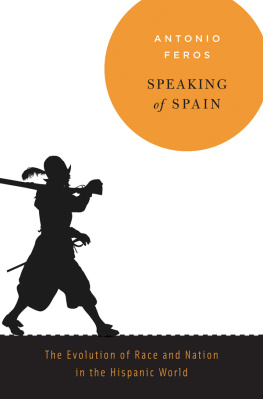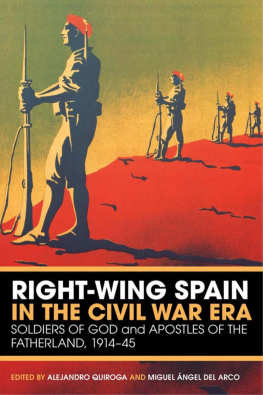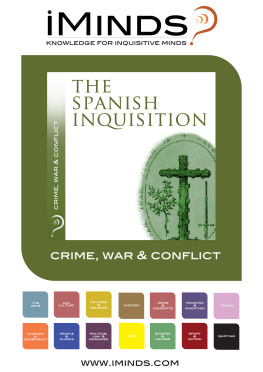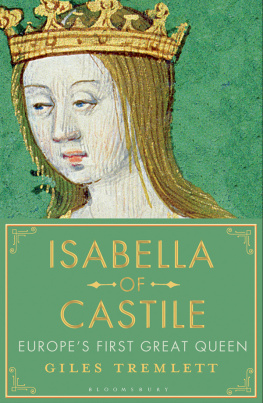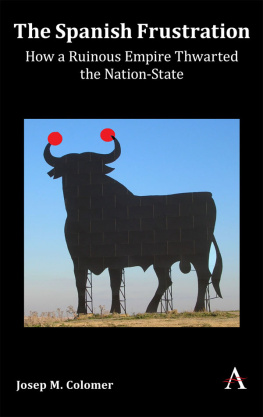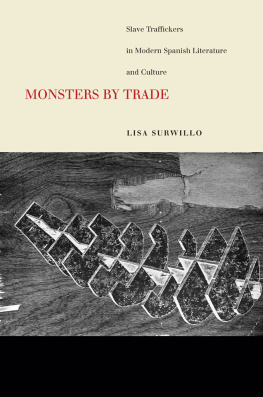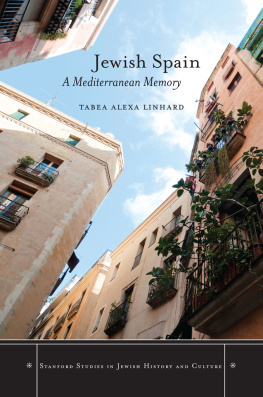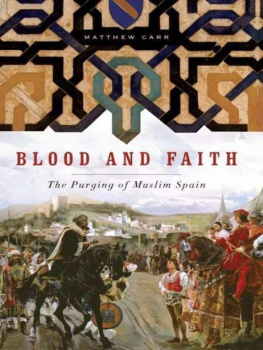Copyright 2017 by Antonio Feros
All rights reserved
Jacket image: Thinkstock/Getty Images (royalty-free)
Jacket design: Jill Breitbarth
978-0-674-04551-4 (hardcover)
978-0-674-97932-1 (EPUB)
978-0-674-97933-8 (MOBI)
978-0-674-97934-5 (PDF)
The Library of Congress has cataloged the printed edition as follows:
Names: Feros, Antonio, author.
Title: Speaking of Spain : the evolution of race and nation in the Hispanic world / Antonio Feros.
Description: Cambridge, Massachusetts : Harvard University Press, 2017. | Includes bibliographical references and index.
Identifiers: LCCN 2016050810
Subjects: LCSH: National characteristics, Spanish. | NationalismSpainHistory. | Cultural pluralismSpainHistory. | RacismSpainHistory. | Spain. Constitucin (1812) | SpainColoniesAmericaHistory.
Classification: LCC DP52 .F47 2017 | DDC 946dc23
LC record available at https://lccn.loc.gov/2016050810
THE YEAR 1492 was a momentous one in Spain, a year that challenged the very notion of what was Spain and who was Spanish. The marriage of Isabella and Ferdinand in 1468 and the subsequent dynastic union of the crowns of Castile and Aragonthe two main states in Iberiameant that, for the first time since antiquity, inhabitants of the Peninsula could think of themselves as part of one polity and subjects of one monarchy. Even as they conquered the last remaining Muslim state on Iberian soil (the Kingdom of Granada) and nurtured a fragile unity, the new monarchy turned outward to initiate the process of imperial expansion in Europe, Africa, America, and Asia. The coincidence of political unification and imperial expansion under the aegis of the Catholic Kings of Spain forced on the inhabitants of the peninsula, and the subjects of the Spanish monarchy generally, troubling and enduring questions about national and racial identity. This early confrontation with the world and its unknown others is also what makes Spain the key case for historical questions about race and nation in the making of the modern western world.
With Spain only ever provisionally unified and Catalonia threatening to regain its sovereignty, with constant debates about the meaning of Spain and Spanishness and about the presence in the country of foreign populations (Jews but especially Muslims and Latin Americans), it is evident that many of the questions Spaniards discussed in the past have resurged prominently in the early twentieth-first century. Although the main subject of this book is not contemporary Spain but the early modern period (sixteenth to early nineteenth centuries), it is all but impossible to understand some of modern Spaniards main preoccupations without looking at the past and our ancestors views and decisions. We need to understand how our ancestors promoted the idea that Spain was a nation while also developing ideas about the characteristics of a Spanish race and ideas about human and cultural diversity within the peninsula and overseas territories under the control of the Spanish monarchy. These are the main subjects of this book.


Hispania, the name used by the ancients to refer to the Iberian Peninsula, is of uncertain origin. However, it has been sufficiently well established that this southern European territory was first settled by peoples from other parts of the Mediterranean and North Africa and later by the northern European Celts. Greeks and Romans recognized that this was a region somewhat isolated from the rest of Europe by one of the continents most imposing mountain chains, the Pyrenees, which meant that access to it was mainly by sea. Impenetrable by land, its internal geography also posed significant challenges, impeding communication to the extent that at various times the regional communities of Iberia were almost completely cut off from one another. Until the medieval period, the impetus to unification invariably came from foreign arrivals (Greeks, Phoenicians, Carthaginians, and especially Romans and Visigoths), who were drawn to the peninsula by its easy maritime access, its natural resources, and the climate in its southern regions. The Romans were the first to gain control of the entire peninsula, or most of it, first as a mere colony and later as an imperial province. Over the course of centuries, from 218 BCE to the fifth century CE, the Roman presence would leave a profound mark on Hispaniaits language, culture, political discourse, and laws. The Roman period also witnessed the settlement in Hispania of Jews from the Roman province of Judea. This was another community of outsiders who would come to play a central role in Iberian history.
The crisis of the Roman Empire also engulfed the Iberian Peninsula, as Gothic peoples from central Europe began to arrive in the early fifth century. The Gothic occupation was completed when one of the branches, the Visigoths, consolidated their power in the closing decades of the fifth century. At least in the symbolism that it later acquired, the period of Visigothic domination, which lasted until the early eighth century, was one of the most important in Iberian history. During this era the various peninsular territories were politically unified for the first time, and Christianity was proclaimed as the official religion, a move that has profoundly marked Spanish history until the present day. Modern historians have questioned the stability of the Gothic regime, and the strength of the Gothic influence on the native population of the peninsula, but nevertheless, the Visigothic period would be invoked from the Middle Ages onward as a sort of model, albeit a mythic one, of an Iberian Peninsula unified in politics and religion.
The Visigothic reign in Hispania ended the way it had begun, with the Visigoths this time on the receiving end of a new foreign invasion, originating in North Africa and representing the tidal wave of an expansionist Islam. The new invaders, known to Spaniards under the generic designation of Arabs or Moors, crossed the Straits of Gibraltar in 711 and within a matter of months had overrun virtually the entire peninsula. Later generations of Spaniards constructed a myth that eighth-century Iberian Christians resisted the Arab invasion to the last breath and stoutly rejected conversion to Islam, but the reality was somewhat different. Many of the Visigothic elites died in military clashes or went into exile in France, large numbers of Christians chose to convert to Islam, and the Jewish minority collaborated with the new invaders. For at least a century and a half following the invasion, there was every indication that Iberia would become yet another province in the orbit of the powerful Abbasid Caliphate with its seat in Baghdad, with the remaining Christians a tolerated minority. Gradually, however, in spite of rather unpromising beginnings, various Christian statelets in the north were consolidated and began making tentative inroads to Al-Andalus in the south. By the fifteenth century, all the elements that would characterize early modern Iberia were in place: the existence of various independent Christian kingdoms that were a product of the struggle against the Arab power but also the presence in the peninsula of three communitiesChristians, Arabs, and Jewsthat were sharply distinguished by their ethnic origins, religion, and culture and each with a significant presence in every region of the peninsula.

